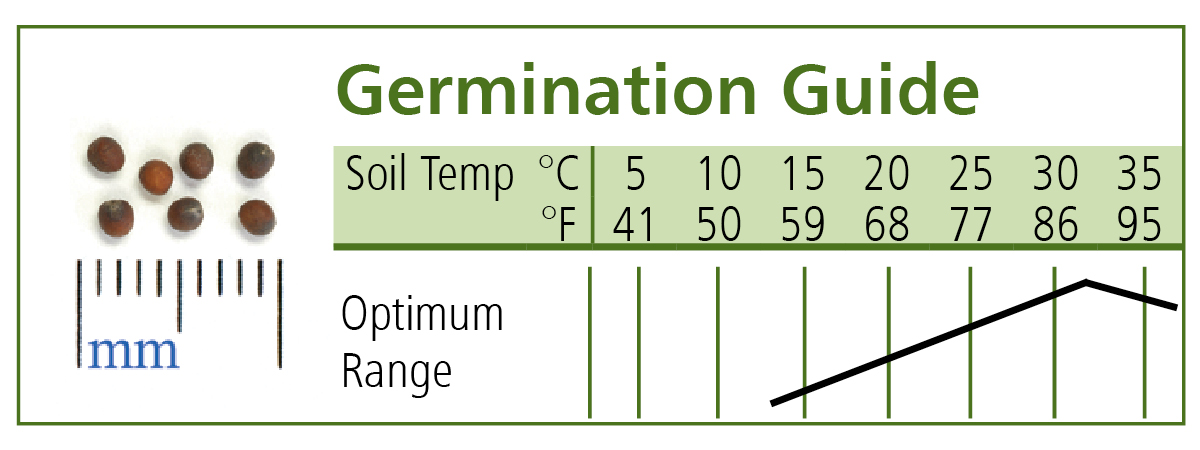Bilko
Organic (F1) Chinese Cabbage Seed
Product ID: 2814G
Full-size organic variety.
Compared to Rubicon, Bilko is slightly bigger at 12", darker green, and a couple of days later. Wide adaptability. Slow-bolting heads have a good, mild, sweet flavor. High resistance to club root and fusarium yellows. NOTE: For ease of sowing, seed is coated with an NOP-compliant film, which gives it a light-colored appearance. USDA Certified Organic. Avg. 135,400 seeds/lb. Packet: 100 seeds.
https://www.johnnyseeds.com/vegetables/chinese-cabbage/bilko-organic-f1-chinese-cabbage-seed-2814G.11.html
Size
Price
Quantity
Availability
For best results, trim heads before storing. They will keep 1-2 months at 32°F/0°C and 95-98% humidity.
SCIENTIFIC NAME: Brassica rapa
CULTURE: Spring-planted crops: Sow 2 seeds per cell, 1/4" deep in 72-cell plug trays. If possible, keep soil temperatures above 75°F (24°C) until germination and then maintain air temperature to 60–70°F (16–21°C). Transplant out in 3–5 weeks, around the last frost date (see BOLTING below), taking care not to disturb roots; water-in plants. Summer/fall-planted crops: Start seedlings as described above in mid to late June or direct seed from late May to mid-July as described below.
DIRECT SEEDING: Sow 3–4 seeds every 12–18" (thin to one plant) in rows 18-30" apart from late May to mid-July.
BOLTING: This crop performs best in the gradually decreasing day length and cooler temperatures of late summer, but can be grown successfully in the spring if careful attention is paid to prevent bolting. For spring and early summer transplanted crops, be sure to wait until the last frost date to transplant or direct-seed the crop. Young plants may bolt to seed prematurely if they are exposed to frost or over a week of sub 50°F (10°C) nights.
DISEASE: Practice preventive crop rotation and sanitation.
INSECT PESTS: Control flea beetles and cabbage root maggots with floating row covers from day of planting.
STORAGE: Heads will store 1–2 months in a near-freezing, humid cooler, or in a root cellar if trimmed and wrapped in newspaper.
HARVEST: Cut when heads are very firm.
DAYS TO MATURITY: From transplanting; add 14–21 days for direct seeding.
AVG. PRECISION SEEDING RATE: 1,000 seeds/333', 5M/1,666', 66M/acre at 3 seeds/ft. in rows 2' apart.
TRANSPLANTS: Avg. 700 plants/1,000 seeds.
SEED SPECS: SEEDS/LB.: Avg. 136,800.
PACKET: 100 seeds, sows 33'.
CULTURE: Spring-planted crops: Sow 2 seeds per cell, 1/4" deep in 72-cell plug trays. If possible, keep soil temperatures above 75°F (24°C) until germination and then maintain air temperature to 60–70°F (16–21°C). Transplant out in 3–5 weeks, around the last frost date (see BOLTING below), taking care not to disturb roots; water-in plants. Summer/fall-planted crops: Start seedlings as described above in mid to late June or direct seed from late May to mid-July as described below.
DIRECT SEEDING: Sow 3–4 seeds every 12–18" (thin to one plant) in rows 18-30" apart from late May to mid-July.
BOLTING: This crop performs best in the gradually decreasing day length and cooler temperatures of late summer, but can be grown successfully in the spring if careful attention is paid to prevent bolting. For spring and early summer transplanted crops, be sure to wait until the last frost date to transplant or direct-seed the crop. Young plants may bolt to seed prematurely if they are exposed to frost or over a week of sub 50°F (10°C) nights.
DISEASE: Practice preventive crop rotation and sanitation.
INSECT PESTS: Control flea beetles and cabbage root maggots with floating row covers from day of planting.
STORAGE: Heads will store 1–2 months in a near-freezing, humid cooler, or in a root cellar if trimmed and wrapped in newspaper.
HARVEST: Cut when heads are very firm.
DAYS TO MATURITY: From transplanting; add 14–21 days for direct seeding.
AVG. PRECISION SEEDING RATE: 1,000 seeds/333', 5M/1,666', 66M/acre at 3 seeds/ft. in rows 2' apart.
TRANSPLANTS: Avg. 700 plants/1,000 seeds.
SEED SPECS: SEEDS/LB.: Avg. 136,800.
PACKET: 100 seeds, sows 33'.
Johnny's is committed to your success, every step of the way.
We want you, our customer, to be 100% satisfied with all of our seeds, tools, and supplies.
If anything you purchase from us proves unsatisfactory, we will either replace the item or refund the purchase price.



